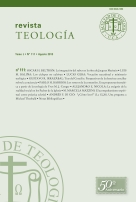Por favor, use este identificador para citar o enlazar este ítem:
https://repositorio.uca.edu.ar/handle/123456789/7615| Campo DC | Valor | Lengua/Idioma |
|---|---|---|
| dc.contributor.author | Beltrán, Oscar Horacio | es |
| dc.date.accessioned | 2019-06-20T00:28:03Z | - |
| dc.date.available | 2019-06-20T00:28:03Z | - |
| dc.date.issued | 2013 | - |
| dc.identifier.citation | Beltrán, O. H. La integración del saber en la obra de Jacques Maritain [en línea]. Teología, 2013, 111. Disponible en: https://repositorio.uca.edu.ar/handle/123456789/7615 | es |
| dc.identifier.uri | https://repositorio.uca.edu.ar/handle/123456789/7615 | - |
| dc.description.abstract | Resumen: En la segunda parte de este estudio se desarrolla la instancia de unidad del saber, tomada bajo dos enfoques: la unidad de orden, que surge de la jerarquía natural de las ciencias en razón de sus distintos objetos formales, y la unidad de integración, que plantea la interacción entre las disciplinas bajo la referencia a un único objeto material. Acerca de la unidad de orden se desarrolla la teoría clásica de la subalternación, con los matices pertinentes a la diversificación actual tanto de las ciencias naturales como humanas. Con respecto a la unidad de integración, se exponen los términos fundamentales del diálogo entre la filosofía, la teología y la ciencia. Finalmente se introduce un aporte original de Maritain que él designó como epistemología existencial, en el que se intenta superar la rigidez de los objetos formales hacia una visión que se orienta a lo concreto. Como ejemplos se introducen el tema del conocimiento por connaturalidad, la ciencia como virtud y la cuestión de la filosofía cristiana. | es |
| dc.description.abstract | Abstract: The second part of this study develops the question of the unity of knowledge, under two aspects: the unity of order, which arises from the natural hierarchy of the sciences due to their distinct formal objects, and the unity of integration, which establishes the interaction between the disciplines in reference to the one material object. As to the unity of order the classical theory of subalternation is developed, with the distinctions called for by the actual diversification both in the natural and human sciences. With regard to the unity of integration, the fundamental terms of the dialogue between philosophy, theology and science are presented. Finally, the original contribution of Maritain, which he called existential epistemology, is introduced, in which an attempt is made to overcome the rigidity of the formal objects towards an outlook directed to the concrete. As examples, the theme of knowledge as connatural, science as a virtue and the question of christian philosophy are introduced. | es |
| dc.format | application/pdf | es |
| dc.language.iso | spa | es |
| dc.publisher | Pontificia Universidad Católica Argentina. Facultad de Teología | es |
| dc.rights | Acceso Abierto | es |
| dc.rights.uri | https://creativecommons.org/licenses/by-nc-sa/4.0/ | es |
| dc.source | Teología, 111 | es |
| dc.subject | Maritain, Jacques, 1882-1973 | es |
| dc.subject | FILOSOFIA CRISTIANA | es |
| dc.subject | SABER | es |
| dc.subject | INTEGRACION | es |
| dc.subject | TEOLOGIA | es |
| dc.subject | CIENCIA | es |
| dc.title | La integración del saber en la obra de Jacques Maritain | es |
| dc.title | The integration of knowledge in the work of Jacques Maritain | es |
| dc.type | Artículo | es |
| uca.path | Teología|2013 Tomo L nº 111 | es |
| uca.disciplina | TEOLOGIA | es |
| uca.filename | /home/data-uca-generic/folder_revistas/Revistas varias/Teologia/111/integracion-saber-jacques-maritain/metadata.xml | es |
| uca.issnrd | 1 | es |
| uca.affiliation | Fil: Beltrán, Oscar Horacio. Pontificia Universidad Católica Argentina. Facultad de Filosofía y Letras; Argentina | es |
| uca.orden | 01 | es |
| uca.version | publishedVersion | es |
| item.fulltext | With Fulltext | - |
| item.grantfulltext | open | - |
| item.languageiso639-1 | es | - |
| crisitem.author.orcid | 0000-0001-9689-9409 | - |
| Aparece en las colecciones: | TEO - 2013 Tomo L nro. 111 | |
Ficheros en este ítem:
| Fichero | Descripción | Tamaño | Formato | |
|---|---|---|---|---|
| integracion-saber-jacques-maritain.pdf | 407,78 kB | Adobe PDF |  Visualizar/Abrir |
Visualizaciones de página(s)
228
comprobado en 30-abr-2024
Descarga(s)
567
comprobado en 30-abr-2024
Google ScholarTM
Ver en Google Scholar
Este ítem está sujeto a una Licencia Creative Commons

